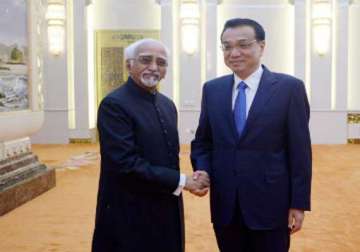Beijing, China: India and China have to narrow down differences and build on convergences by exploiting the potential of Panchsheel, the five principles of peaceful coexistence propounded by the two countries along with Myanmar in 1954, Vice President Hamid Ansari said on Saturday.
"In our respective bilateral relations, our common interests far outweigh our differences," Ansari said while addressing a commemorative meeting of the 60th anniversary of the five principles in which Chinese President Xi Jinping and his Myanmar counterpart Thien Sein also took part.
"On the way forward, we have to build on our convergences and narrow down our differences. Panchsheel can help us exploit this potential for cooperation and come up with fresh, innovative initiatives to improve the lives of our people," Mr Ansari said.
Panchsheel was enunciated by former Prime Minister Jawaharlal Nehru along with his then Chinese counterpart Zhou Enlai. Myanmar subsequently endorsed it.
Mr Ansari, who is on a five-day visit to China, said India, China and Myanmar are bound by age-old linkages and geography.
"We may be at different stages of development but we can learn from each other's national experiences," he said.
"We need a new paradigm for global action. Our destinies are intertwined. Our quest is, should be, for a framework in which opportunities and challenges for the betterment of our societies co-exist," he said.
"In this endeavour, Panchsheel can act as a catalyst to help us better coordinate our efforts, enhance mutual understanding, share developmental experiences and tackle trans-national threats more effectively," he said.
In his address, Mr Ansari said besides being ancient civilizations and neighbours, India and China are also strategic partners.
"Historically, there has been much that has bound us together, not merely through the exchange of goods and commodities but through a flourishing interchange of ideas, values and philosophies," he said.
"The imperatives of the 21st century propel us towards a better understanding of each other's objectives and more purposeful cooperation for mutual benefit. Greater interaction between the people of our two countries, in all fields, is a necessary condition for stronger overall bilateral relations," he said.
India-Myanmar relations which are rooted in shared historical, ethnic, cultural and religious ties with geographical proximity has helped develop and sustain cordial relations and facilitated people-to-people contacts.
Latest World News
